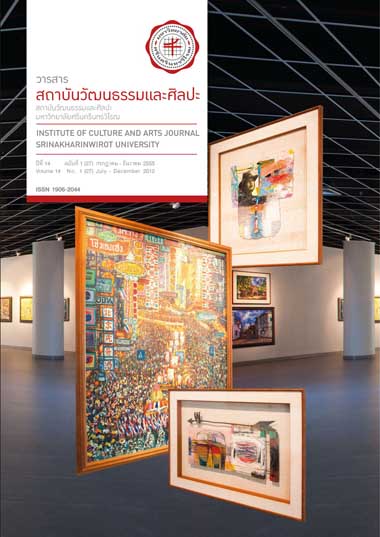กระบวนการเรียนรู้ศิลปะในบริบทสังคมและวัฒนธรรมชายแดนภาคใต้: กรณีสถานศึกษาของรัฐPROCESS OF ARTS LEARNING IN SOCIAL AND CULTURAL CONTEXT OF SOUTHERN THAI BORDER: CASE STUDY OF PUBLIC EDUCATIONAL INSTITUTIONS
บทคัดย่อ
บทคัดย่อ
การวิจัยครั้งนี้มีวัตถุประสงค์เพื่อศึกษาปัจจัยที่ส่งผลต่อกระบวนการเรียนรู้ศิลปะ สภาพการณ์ของกระบวนการเรียนรู้ศิลปะในบริบทสังคมและวัฒนธรรมชายแดนภาคใต้ ในสถานศึกษาของรัฐโดยใช้วิธีวิจัยเชิงคุณภาพ ผู้วิจัยเลือกเก็บข้อมูลโดยวิธีสัมภาษณ์เชิงลึก การสัมภาษณ์กลุ่ม การสังเกตจากผู้ให้ข้อมูลที่เป็นนักเรียน นักศึกษาและผู้ที่เกี่ยวข้อง ผลของการวิจัยพบว่า ปัจจัยที่ส่งผลต่อกระบวนการเรียนรู้ศิลปะในสถานศึกษาของรัฐ ด้านที่ส่งเสริมได้แก่ ความรักและความถนัดทางศิลปะ การมีประสบการณ์และรับรู้ศิลปะในพื้นที่อื่นๆ ความเสียสละของผู้สอน การเห็นแบบอย่างความสำเร็จของผู้ศึกษาศิลปะอยู่ในพื้นที่ สภาพครอบครัวที่มีการศึกษาดีและมีความคิดก้าวหน้า ด้านอุปสรรคได้แก่ ความเชื่อและความศรัทธาทางศาสนาที่แตกต่างกัน ความคิดเห็นทางสังคมและวัฒนธรรมที่แตกต่างจากรัฐไทย การตั้งอยู่พื้นที่ห่างไกลจากศูนย์กลางอำนาจ ด้านสภาพการณ์ของกระบวนการเรียนรู้ศิลปะ ในสถานศึกษาพบว่ามีขั้นตอนต่างๆ ด้านการเรียนรู้ด้านทฤษฎีคือ การฟังบรรยายจากผู้สอน การอ่าน การสอบ และประเมินผล ด้านปฏิบัติคือ การฟังและดูการสาธิตจากผู้สอน การปฏิบัติ การฟังการวิจารณ์ และประเมินผล อย่างไรก็ตามในระดับการศึกษาขั้นพื้นฐานเน้นผู้เรียนเป็นศูนย์กลางมีปัญหามากกว่าระดับอุดมศึกษา ภายใต้บริบททางสังคมและวัฒนธรรมชายแดนภาคใต้ สิ่งที่กระทบต่อกระบวนการเรียนรู้ในสถานศึกษาคือ ผู้ปกครองใช้หลักศาสนาอิสลามตีความหมายงานศิลปะแตกต่างกัน การเผยแพร่ศิลปวัฒนธรรมแบบรัฐไทย ผ่านสถานศึกษาของรัฐในสามจังหวัดชายแดนภาคใต้มีการยอมรับไม่เท่าเทียมกัน ทำให้ขาดเอกภาพในการจัดการ สภาพชายแดนไม่ได้เป็นปัญหาต่อผู้เรียนในพื้นที่ หากไม่ยึดศูนย์กลางอำนาจรัฐ ผู้เรียนส่วนใหญ่ชื่นชมภูมิใจและสนใจเรียนรู้ศิลปะในพื้นที่ตนเอง แม้วัฒนธรรมต่างกันพร้อมจะแลกเปลี่ยนเรียนรู้ศิลปะระหว่างกัน คนที่มีศาสนา ภาษา วิถีชีวิตต่างกันสามารถเรียนรู้เพื่อสร้างความเข้าใจได้โดยใช้ศิลปะเป็นสื่อกลาง อย่างไรก็ตามผู้เรียนชาวพุทธจะเปิดใจเรียนรู้ศิลปะข้ามวัฒนธรรมมากกว่าไทยมุสลิม ทั้งนี้ผู้สอนต้องสร้างกระบวนการเรียนรู้โดยให้คนแต่ละวัฒนธรรมยังคงรักษาอัตลักษณ์
คำสำคัญ : กระบวนการเรียนรู้ศิลปะ สังคมและวัฒนธรรม ชายแดนภาคใต้
Abstract
This research was conducted to explore factors affecting the process of learning and authentic learning environment of art in the social and cultural context of the southern Thai border in the public educational institutions. The study utilized qualitative research design using in-depth interviews, group discussions and non-participating observation with the research informants including school and university students and corresponding people. Results reveal that constructive factors for the art learning process in social and cultural context of the southern Thai border in the public educational institutions comprise the learners’ affection and aptitudes in art, their experiences and appreciation of art in different areas, the type of family they grow up with (educated and conversant family), their recognition of accomplishment of the local area artists and the commitment and affection of the art teachers. The hindering factors for the art learning process in social and cultural context are differences in religious beliefs and faiths, differences in cultural and social opinions from the Thai State, the location of the institutions remote areas, far away from managerial areas. The process of art learning is divided into theory learning in the forms of attending lectures, reading, taking exams, and assessment. In the practical stage, the learning process includes listening to and watching the demonstrations and instruction from the teachers, performing, getting feedbacks, and assessing results. It was found that the process of learning art through the learner-centered approach was more problematic in the primary and school levels than in the university level. The problems found in the art learning process in social and cultural context of the southern Thai border in public educational institutions are that the Muslim parents relied on different standards of religious beliefs and principles in interpreting the central Thai and Buddhist art. These different criteria caused different levels of counter acts, and this brought about non-conclusive management in process of art learning and teaching. The bordering state status was not found as a problem to the learning process as long as the learning is locally focused and not centralized by the central government. Most of the learners appreciated their local art and were proud and interested in learning about their indigenous art. They were willing to share and exchange the local talents among local people with different social and cultural backgrounds. People with different languages, religions and ways of living could share and learn from each other through art. In general the Thai Buddhist learners were found to be more open-minded to learn the cross cultural art than Thai Muslim art learners. It is recommended that art teachers should design the art learning process that helps learners maintain their identities and cultural belief.
Key words: process of arts learning, social and cultural context, Southern Thai border
Downloads
ดาวน์โหลด
รูปแบบการอ้างอิง
ฉบับ
ประเภทบทความ
สัญญาอนุญาต
บทความทุกบทความที่ได้รับการตีพิมพ์ถือเป็นลิขสิทธิ์ของวารสารสถาบันวัฒนธรรมและศิลปะ มหาวิทยาลัยศรีนครินทรวิโรฒ



